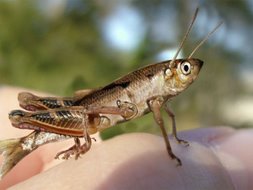Wednesday, June 28, 2006
Journal Club
Phillips and Shine, 2006. An invasive species induces rapid adaptive change in a native predator: cane toads and black snakes in Australia. Proc. Roy. Soc. B. 273: 1545-1550
Tuesday, June 27, 2006
And some more...
Impressive new Impact Factors for BioMed Central's open-access journals
Eleven journals published by BioMed Central received their first Impact Factor this month. With nine journals in the top 10 of their 2005 Journal Citation Report category, and ten journals with a 2005 Impact Factor exceeding 3.00, BioMed Central's open access journals are confirmed as publishing high-quality, highly cited research.
Many journals in the BMC series also received their first Impact Factors this year. BMC Developmental Biology, with an Impact Factor of 5.41, is ranked at number six in the developmental biology field. BMC Structural Biology enters the Biophysics category at number eight, with an Impact Factor of 5.00. BMC Evolutionary Biology, with an Impact Factor of 4.45, is the 6th most highly cited journal in the Evolutionary Biology category. BMC Biotechnology (3.05), BMC Neuroscience (2.73), BMC Microbiology (2.18) and BMC Gastroenterology (1.46) also received their first Impact Factor.
Read more on the BioMed Central website
Thursday, June 22, 2006
Additional info about open access journals
Citation Advantage of Open Access Articles.
Gunther Eysenbach.
PLOS, 4(5), 2006, pp. 692-698.
Open-access journal hits rocky times
Read more on the Nature website
Thursday, June 08, 2006
The 3rd International Conference of Quantitative Genetics
Preliminary Announcement
The 3rd International Conference of Quantitative Genetics
Zheijiang University, Hangzhou, China August 18-24, 2007
The 3rd International Conference on Quantitative Genetics (ICQG)
will be held during August 18-24, 2007 at Zhejiang University in
Hangzhou, China. As with the 1st ICQG in Ames, Iowa in 1976 and
the 2nd ICQG in Raleigh, North Carolina in 1987, the 3rd
Conference will be a comprehensive survey of the current status
of quantitative genetics. New technologies in areas ranging from
genomics and molecular genetics to statistics are providing both
opportunities and challenges for our understanding of the genetic
basis of quantitative traits in natural populations, the
evolution of characters, and use for plant and animal
breeding. Program suggestions will be welcomed by the Conference
Organizers listed below.
Zhejiang University is one of the few top-rank research
institutions in China. It is a comprehensive institute with a
full range of disciplines. With a faculty capable of top-level
and large-scale research and a high proportion of graduate
students, the university has been undertaking projects, both
basic and applied, to address pressing issues and challenges of
today and of the future.
The City of Hangzhou is one of the seven ancient capital cities
of China. It has a population of 3.72 million and has a recorded
history spanning 2100 years. Marco Polo described Hangzhou as the
"Most beautiful, magnificent, and heavenly city in the world."
Located in China's most developed southeast coastal area,
Hangzhou is renowned for its thriving economy, colorful culture
and beautiful landscape, especially its famed West Lake and Tea
House.
Academic Chairs: Bruce Weir (bsweir@u.washington.edu) and Bill Hill
(w.g.hill@ed.ac.uk)
Academic Co-chairs: Junyi Gai (sri@njau.edu.cn) and Changquin Wu
(chxwu@public.bta.net.cn)
Conference Organizers: Jun Zhu (jzhu@zju.edu.cn) and Zhao-Bang Zeng
(zeng@stat.ncsu.edu)
Tuesday, June 06, 2006
Journal Club 21 June - Different Model (requires preparation)
For the 21st, I want each of us to find one paper and spend 2-3 minutes speaking about that paper and it's merits. To keep things a bit focussed, I suggest we limit ourselves to papers from open-access journals (PLoS Biology, BMC titles, etc). This will give us a chance to find out about some of these interesting journals and their publishing model at the same time as learning about the science. Please send me your paper's title ahead of time so I can be sure there won't be duplication.
Rob
PS. Think and let Simon, Erik and I know (or post on this blog) what you think about this model. We can use it in future to target particular journals, fields, taxa or time periods in the history of Evolutionary Biology.
Friday, June 02, 2006
Journal club 7/6/6
Evolution: Do Bad Husbands Make Good Fathers?
David H. Hosken and Tom Tregenza.
Current Biology, 15(20), 2005, pp. 836-838.
(Short review)
Assessing putative interlocus sexual conflict in Drosophila melanogaster using
experimental evolution.
Andrew D. Stewart, Edward H. Morrow and William R. Rice.
Proc. R. Soc. B., 272, 2005, pp. 2029-2035.

